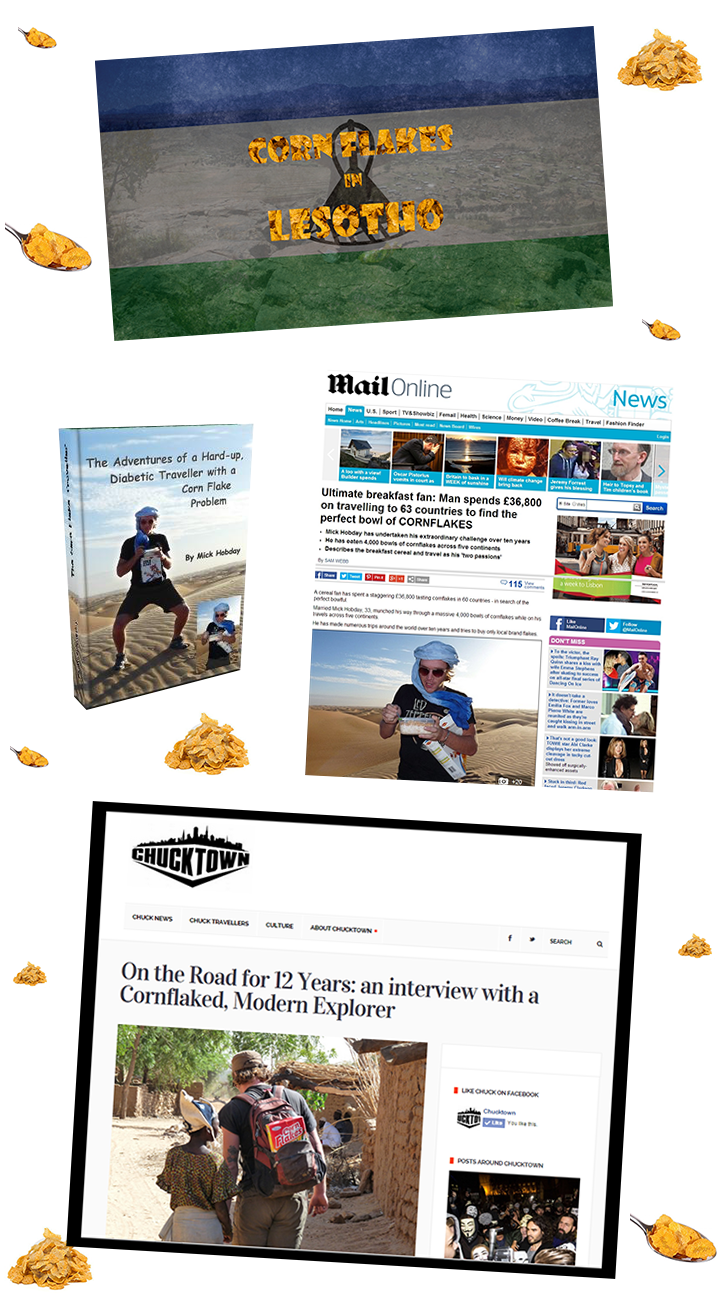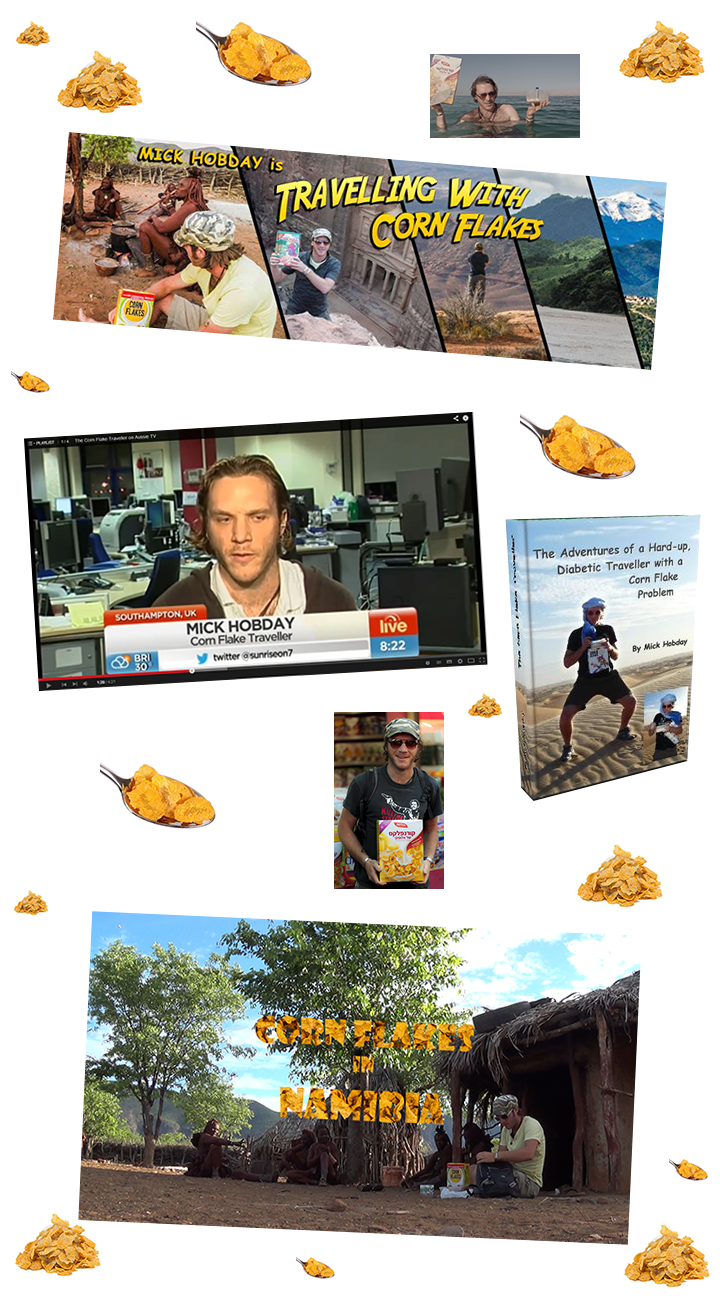.
Speaking at the JDRF Type 1 Discovery Day
.
I videoed the talk which you can watch above or for those of you who prefer to read please see below.
.
.
Hi I’m Mick Hobday, I’ll start by introducing myself a little as I’m sure some of you are wondering who the hell I am.
Professionally speaking I am a jack of all trades. I have worked as a scuba diver in Honduras, a cycle courier, a doorman, a waiter and as a painter and decorator in New York, a cancer research lab assistant in a in Los Angeles, a holiday Rep in France and Spain and in the U.K I have done all sorts – stacking shelves, data analysis, I worked briefly as a bad cook and there were other ways I earned money to fund my real passion in life…which is travelling.
I was diagnosed with type-1 diabetes when I was 9 years old, I went through the schooling system which ended when I graduated from Nottingham university with a degree in Genetics. I chose not to pursue a career but rather to hit the road and now 14 years and 82 countries later I’ve been written about in numerous newspapers and magazines, interviewed on a number of radio stations from different countries and I even appeared live on Australian breakfast time TV.
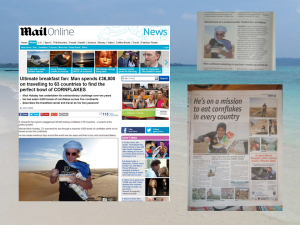
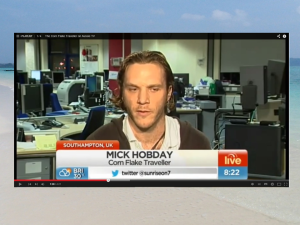
For the first 10 years I didn’t really tell my story, I just had a blog so my family and friends could read about what I was doing but after a decade I decided to write a book, to build a couple of websites and I started making films which I put on my youtube channels. I also blog for diabetes.org.uk as I would like to inspire people not to let their disease get them down or stop them doing the things they want to do in life and I want to help people to see the positive side of being diabetic.
So I am a traveller, an author and a film maker known as The Corn Flake Traveller, this is because my mission in life is to eat a bowl of cornflakes in every country in the world. I’ve just got back from a 2½ month road-trip around Poland, Estonia, Latvia and Lithuania –
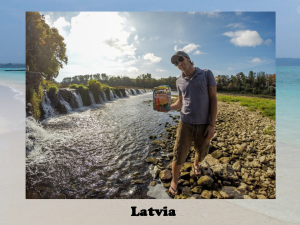
this is my Corn Flake eating moment from Latvia (next to Europe’s widest waterfall)
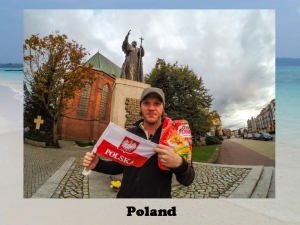
this is from Poland (one of the most religious countries I have visited hence the photo with the former Polish Pope).
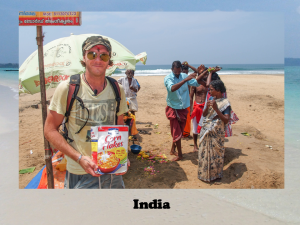
This was my shot from India – most religious country with Hindu ceremony
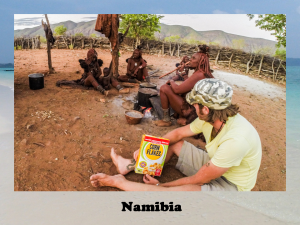
Namibia – taken when I stayed with a tribe with very little contact with the outside world
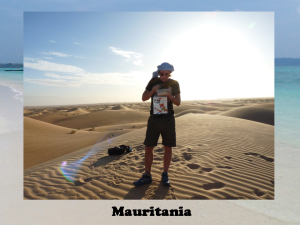
Mauritania – this is one of my favourite shots taken in the Sahara
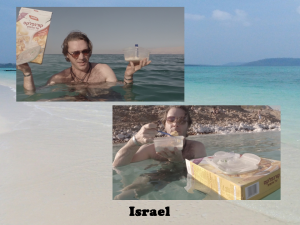
Israel – I ate these flakes while floating in the Dead Sea
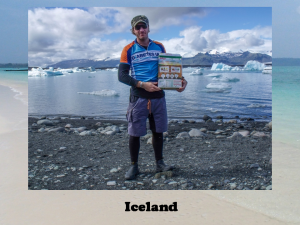
Iceland – taken next to a lake full of beautifully shaped icebergs
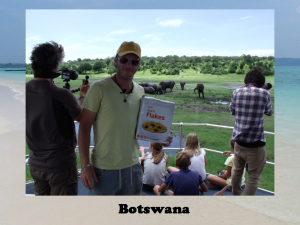
Botswana – on this day I saw around 500 elephants
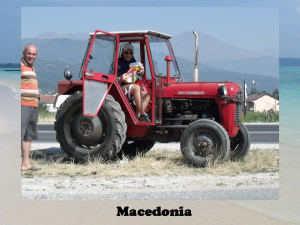
Macedonia – I cycled through the country which was predominantly farmland so I sat in a tractor for the shot
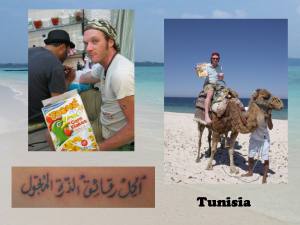
Tunisia – I’m sat on a camel and I’m getting ‘The Corn Flake Traveller’ tattooed on my arm in arabic
Young Me and Personality Shaping
Anyway so the life I have led is a little different to most and I’d like to give some credit to diabetes for shaping me to be like this as there were aspects of my young diabetic life which were influential in shaping my personality.
Firstly, growing up having such a structured day, with injections and meal times set in stone and having to eat 2 digestive biscuits at set times, instilled a slightly rebellious side to my personality and made me really want to live a free and independent life. One of the first things I did was to change the type of insulin I was taking. I was on mixtard injecting twice a day but the military style structure eventually got to me so I quickly changed to the fast-acting/slow-acting 4 times a day treatment, which gave me much more freedom and flexibility to do what I wanted with my time.
I also remember being repeatedly told that I should have good control or I might develop complications that might reduce my life expectancy, I think the intention was to inspire me to take care of myself (which it did) but it also made me think I should enjoy life now while I can and it made me think “I’m here for a good time not a long time”. Of course I would like to live for a good long timebut I didn’t want to let having diabetes make me worry about complications or death to the extent that it stopped me living. That being said I still check my blood sugars on a regular basis and although I am travelling much of the time, I make sure that I go for check up’s whenever I’m home and I am also very conscious of the condition of my eyesight, blood pressure and the sensitivity of the feelings in my feet.
Diabetes also helped me to take care of myself and not to rely on anybody else. This is due to the occasions when nobody was around and I really needed some sugar, which has also helped me on my travels as I have had many occasions when I needed to find some inner strength. One occasion I feel particularly proud of was when I was cycling around Europe in 2006; I woke up in my tent in the middle of Austria going hypo only to find out my sugar container was empty. I had to pack up all my camping gear and cycle over 20 miles carrying 25-30 kilos to the next village to buy some sugar.
So it’s helped me become fiercely independent but I would like to add that having been diabetic for 28 years now I can tell you from experience that there are always times when you get random, unpredictable hypos that are out of your control and I have needed help on countless occasions over the years. When I was travelling in Bolivia I had a hypo during the night and I’m not sure how it happened but the owner ended up cooking me dinner at about 3 o clock in the morning, which really helped me as the next day I was visiting a mine with 13 year old boys working for £1.20 an hour.
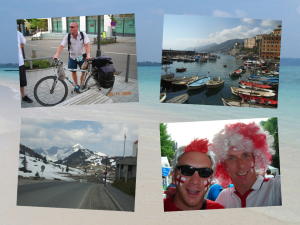
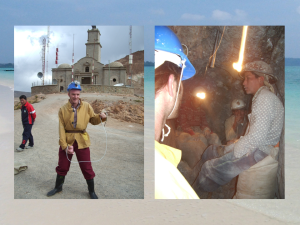
Also don’t be scared to ask for help, I have 100’s of stories of people helping me out, not just with diabetes related issues but many things. This guy called Commando was my favourite experience when he lent me his house for the night, giving me the opportunity to stay in a shanty town but, so don’t be afraid to ask people for help if you think you need.
Diabetes also made me realise we are all different but all equal. At senior school my mum was adamant that I wouldn’t be treated differently so I just used to inject in the class room and in front of all my classmates. One day I was spotted by Cruella de Vil, one of the teachers who took offense and took me straight to the head teacher. Here I was lectured about the damage this could do to the school image if the press saw me and the damage I was doing to other students by encouraging drug taking. My mum went crazy and presented a case to the headmaster for me to be able to inject freely on the basis of not being treated differently by having to go to the medical room every time I needed insulin. We won and I was allowed to feel normal again, I educated fellow pupils and teachers about my diabetes. I even stood up in front of class and talked people through my condition with pictures of the pancreas and needles and from then on everyone knew I was diabetic, everybody knew I needed to inject and after seeing me “perform” an injection nobody batted an eyelid when I did it.
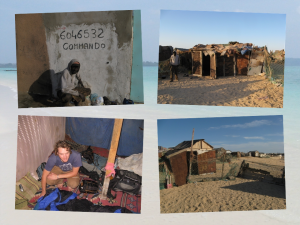

I’ve found that educating people is very important in helping me with any serious hypos I had, although I found this out the hard way. When I was 14 years old I had a hypo and was found by a friend ‘asleep’ in a puddle in the park, she proceeded to inject me with insulin, obviously making the situation worse. I eventually came back to the world and once I had calmed down I realised it wasn’t her fault as she thought I was an ill diabetic and a diabetic’s medicine is insulin. This is something I always make sure people I travel with know, that if I am acting weird to give me sugar and you might want to try and avoid such things happening to you by instilling in people that if you need insulin your brain will be ok and you can fix yourself, but if you are acting weird you need sugar.
Some Other Plus–side to diabetes
So I used to think of diabetes as a negative thing in my life but over the years I have come to realise that it has brought me positive things too it has shaped my personality and made me a stronger person and I’m sure it will make you a stronger person.
It has made me very aware of the things that I put into my body meaning I generally avoided eating junk food and my diet has been a hell of a lot better than it would have been if I hadn’t have been diabetic. Injecting in public has allowed to me to meet curious people who have asked me questions and I have even allowed other people to inject me over the years, which has been a brilliant ice-breaker.
Hypos
Hypos are annoying but on reflection some of them have been fascinating, you experience a change in perception, something that many people like to do especially on the weekend down the pub. And some of these experiences have been a really big tick off the list for someone that wants to experience as much as possible in life.
So hypos can affect your mind and body in a large number of ways and by varying degrees of severity so diabetics be aware that if something doesn’t seem right it probably isn’t and embed it in your head that if something is strange eat something sweet. I say embed because serious hypos can cause the subconscious, fight or flight part of the mind to take over and you might not be thinking clearly. I have acted completely crazy at times girlfriends past and present would love to tell you stories of how moody I have been and how daft and juvenile I can sometimes act, and my parents could tell you about the many times I have become aggressive. The subconscious mind in survival mode isn’t rational; when I am in this state of mind I often don’t want any help and even refuse it quite aggressively, luckily my loved ones have developed ways to rise above my emotional outpouring, which usually involves them treating me like a child and offering me rewards if I eat sugar. So parents beware it might not be because you have a moody teenager, they could be hypo so give them sugar no matter what they call you and I if in doubt prick a finger, you’ll either find out they are hypo or inflict some pain, win-win.

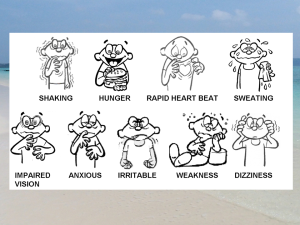
I find the delusion of the hypo experience to be much worse if I don’t have sugar straight away, in fact the more I prolong eating sweet stuff the worse the delusion is, more common at night as I am not awake to eat anything. I have also had memory deleted during hypos that start when I’m sleeping; the scariest, most profound and on reflection most amazing experience was when I was travelling around South America and flew home to see my family.
I had just spent 26 or 27 hours flying home from Buenos Aires and I arrived at my mum’s empty house shattered so decided to have a little afternoon nap. During this little siesta my blood sugar level must have dropped and I woke up in a really strange state of consciousness, the combination of the jet-lag, the hypo and (like with many hypos during the night) some of my memory was missing so I couldn’t remember travelling back to the UK. As I said the house was empty and in this strange state I couldn’t really work out why I was in my mum’s house and my only conclusion at that time was that I had died and gone to heaven. I wandered around the house for about an hour trying to remember how I had died and what the hell had happened to me until I finally thought “hmmm I wonder if I’m going hypo” and just to make sure I decided to eat some sugar. Eventually reality became more lucid and I realised I wasn’t dead, I cried a lot of tears of joy and relief as I had been thinking I was dead for so long and almost accepted it.
I have found hypos to affect my emotions, the worst is when I feel a sudden feeling of ‘there is no hope’ and I feel suicidal. The first time this happened was pretty dangerous as I was walking down the street in New York and suddenly started seriously thinking about jumping in front of a bus. Luckily I thought, “well before I jump I might as well have some chocolate bars”, a kind of last supper and I started feeling better shortly after. I still get these sudden drops in my happiness but they are much easier to handle now that I know the cause and I am aware what’s going on when it happens.
I’ve had all the usual symptoms of going hypo such as sweating, hunger, dizziness, shakes, weakness etc etc but I’ve also had some that I haven’t seen written about. For example on maybe 7 or 8 occasions in my life a hypo has affected my nervous system and caused me to spasm or jerk uncontrollably. The first time this happened was when I was on a balcony in Buenos Aires watching protests below and I lost control over my body. Again scary the first time as I didn’t know what was going on not because I was 4 or 5 floors up but again other times this particular hypo symptom has occurred have been pretty funny really. One time my step-dad came home and found me on the floor moving like I was having a fit. After I reassured him I was alright we were in hysterics as I shook my arms and legs all over the kitchen floor. This does make it harder to eat sugar though, one of these hypos caused me to spasm and throw a bowl of sugar covered corn flakes all over one of the hallway walls so if this ever happens to you I recommend getting down on all fours or hold on to something.

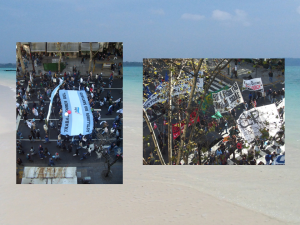
Observations from Travelling with Diabetes
Most of the problems I have had while travelling have been related to the food available or my insulin supply. For example when I was in South America my insulin stopped working because I didn’t keep it cold for more than a year and had to arrange for my mum to bring me some more. In Vietnam I ran out of insulin because I smashed some vials so I spent 3 weeks exercising a lot, eating wisely and injecting a type of insulin I was unfamiliar with to avoid getting ketoacidosis. It is useful to know there are quite a few different types of insulin and in other countries there are types we don’t get over here and they might be called different things, for example mixtard is called 70/30 in the U.S.
So now I always carry extra insulin, I usually take an extra 50% of the amount I need and I always take batches with different sell by dates in case the heat affects it; usually the oldest insulin stops working first so I can switch to a newer batch while I work out how to get more. I keep my insulin protected by using Tupperware containers stuffed with socks for padding. If you travel you might want to keep your insulin cold so find out if the hotel has a fridge or maybe you need to buy some of the products available to do the job.
When I fly I always carry my insulin in my hand luggage to prevent it from freezing in the cargo hold, plus if the airline loses my checked-in bag I know I have got those vital vials with me. I also carry plenty of sugar on flights as nervous moments like turbulence or landing can cause my blood sugar to drop a bit. Those with strict control over their diet should be aware that you have the option of a diabetic meal, something I used to do but don’t anymore as they tend to taste even worse than the standard meals. Oh, and if your flight is delayed significantly, tell the airline your schedule has been disrupted and you need some food vouchers, it doesn’t always work but has for me on some occasions. Although don’t tell Ryan Air you’re diabetic as they will probably charge you extra for the weight of your insulin and they would never give you vouchers anyway.
I’ve only had a couple of problems taking sugar or needles on flights or across borders. Once was when I flew out of Israel, but I must say they were particularly paranoid and suspicious of me as I was carrying a Palestinian flag in my luggage. The only other time was when I was taking a boat down the Amazon River and I crossed from Peru into Brazil. The customs chaps woke me up out of my hammock at about 3 in the morning and because they found some sugar and insulin vials they made me completely empty my entire backpack.
.
Other things to consider when travelling include:
.
- The standard of healthcare available – whether it’s free or you need insurance and consider if you need the security of an ambulance with an engine rather than being taken to hospital on horseback.
- The time difference – large changes in time difference cause a couple of problems.
Firstly to adjust to the new time zone I have a period of time with either no slow-acting insulin running around my body, or I might overlap and have a double dose. This means that my blood sugar level is continually rising or dropping but all I do is just monitor my blood sugar more frequently and either inject more fast-acting insulin to bring my blood sugars down or eat the odd sweet to keep it up.
Secondly I have noticed that changes to my body clock can affect the insulin dose I require, with big time zone changes I have had to drop or increase my dose by a couple of units, particularly at night-time. Again all I do is more blood tests and it is much easy now I am aware this can happen. My body clock has had a major effect on my blood sugar levels, I had a pretty weird week when I was working the night shift at Tesco’s and had some severe hypos despite reducing my insulin dramatically. I wrote a blog post for diabetes.org.uk if you want to know more about this.
- The temperature and altitude – I find a dramatic change in air temperature alters the number of units I need for example if I move from a cold climate to a hotter one I need fewer units, particularly noticeable with my night-time insulin.
- I have also found a change when I move between different altitudes, but when you change altitude significantly the temperature also changes so I am not sure if it is the air pressure or the temperature change that affects me, worth bearing in mind though.
.
Food
Another thing to consider when going on holiday is the type of food that is available; I personally don’t worry too much about it as I am used to just adjusting my fast-acting dosage but if you’re not so confident with changing what you eat then learn about the foods available in your destination. And you can always do what my mum used to do and take a suitcase full of digestives and Corn Flakes.
Being a diabetic has actually been a blessing in disguise because chocolate and generally unhealthy food were always off limits meaning I just ignored the incessant bombardment of adverts trying to persuade me to eat rubbish. For this reason I genuinely prefer fruit and veg and my last supper would probably be a vegetable stew rather than a cheesecake.
Of course I love chocolate, and cheesecake who in their right mind wouldn’t and I remember when I was first diagnosed being devastated that I would never be able to eat chocolate ever again but my fears were not at all necessary. I sometimes eat cake or chocolate to bring me out of hypos and on my cycling trips around Europe I used to cycle 60, 70 miles a day with 30 kilos of gear so I needed to eat sweet stuff to stop me going hypo, so if you’re sporty you can easily sneak some naughty food into your diet. I think the less sugary foods you eat the better and the better your control will be but it is not something I avoid like the plague, I just inform myself what is in what I eat and do lots of blood tests.
I am generally a healthy eater but my relationship to food while I am on the road is slightly different as I am less able to control what I eat either due to limited choice, trying something new or because I am someone’s guest. There have been occasions when I have been given food but not been able to fully communicate and therefore not really known exactly what I was eating.
There was a time in Mauritania when I was invited to have lunch with a taxi driver who wanted to introduce me to his family. They must have used a sweet ingredient, but I tested my blood sugar after eating, saw it was increasing and injected a little more, problem solved. I have also tried some strange fruits (one fruit in Vietnam that looked like a dragon fruit springs to mind) where I knew nothing about and it didn’t taste sweet. 30 minutes later I did a blood test only to find out it obviously was so I injected more and made sure I injected more if I ate that fruit again.
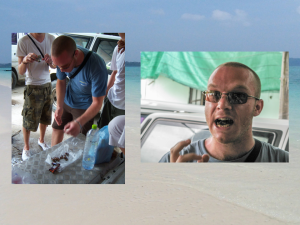
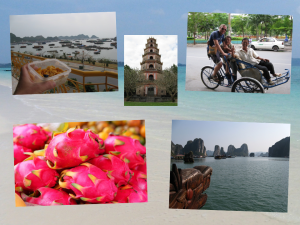
.
A Message to Young Diabetic Rebels
So I would like to say something to the young people who have recently become diabetic and any diabetics feeling a bit scared or upset because of having diabetes.
Just strive to do your best and make the choice to care of your body, I didn’t during the first few years of being diabetic, I didn’t take it that seriously but I read a book by a footballer called Gary Mabbutt who played for Tottenham and England and it gave me the hope that diabetes didn’t have to hold me back. There are plenty of successful diabetics leading interesting lives and I bet all of them took care of themselves and its pretty easy really, most of it is mental obstacles. You just have to get your head round eating well and exercising but everybody on the planet should be doing this, a hint for your parents there. You just have to do some injections and enough blood tests to know that your blood sugar levels stay with safe limits and you can have a fruitful and long life, don’t forget it only takes 30 seconds to test your blood. Nobody is perfect don’t let a few bad days worry you, learn from healthcare professionals who know what they are talking about and genuinely care, let them give you the skills you need to take better care of yourself.
I remember thinking in the first few years of my diabetic career that I didn’t like being told what to do, what to eat or when to inject and I couldn’t imagine being old, it was too far into the future. If I could talk to my young self I’d say learn from those around you how to take care of yourself, you better hope you make it to an old age and if you’re lucky enough to reach that age do you want to be elderly and full of life or elderly and waiting to die.
Don’t let your diabetes control your life, take control of it by taking care of yourself, diabetes is a condition that is totally controllable and there are a lot worse conditions to have. Let it shape into a stronger, better person, use it to eat well, use it to inspire you to exercise and inspire you to live your life. I travelled to 82 countries and done a lot with my life so far but I wouldn’t have done much without taking care of my diabetes, as I said nobody is perfect and I’ve had some dodgy times but I always wanted to and tried to do my best to take care of myself. My advice to you would be give yourself plenty of time and a healthy body to explore this beautiful planet, be prepared, don’t be scared and enjoy some of the experiences diabetes will bring you.
So there we go if you want to find me online I’ve got a couple of websites, both with YT channels, FB pages, Twitter and all that kind of stuff and I invite you to make friends with me online. I am happy to help people and give advice, plus you can see my favourite photos, see all the ancient sites I’ve visited, you can watch some of my films, read about me almost being kidnapped by Al-Qaeda, sleeping outside Venice with 200 dogs, hot-air ballooning over the Valley of the Kings, diving with sharks, riding an ostrich, all the things I did with my blood testing kit close at hand.
Oh and if you would like to see this talk again then as I said I am making a video so you can subscribe to my youtube channel to be notified when I publish it, in fact please subscribe anyway you might like some of my films. So do we have time for any questions, if not you can come and speak to me afterwards or as I said you can make friends with me or just contact me online.
.
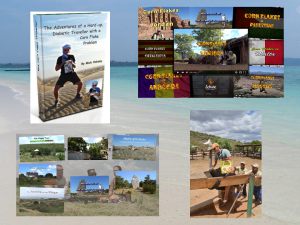
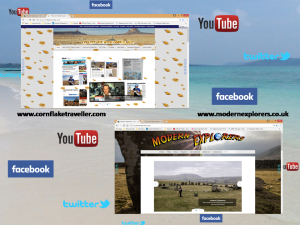
.
So having diabetes has been both beneficial and a nuisance and travelling with diabetes has created hurdles but nothing that cant be overcome with a little organisation. Feel free to contact me if you are diabetic and want advice or have any questions.
.
I am also one of the bloggers for diabetes.org.uk – take a look at some of my blog posts
.
.







